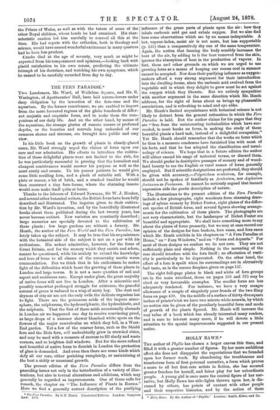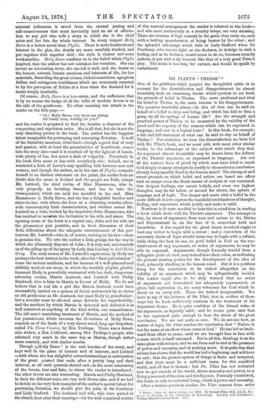MOLLY BA WN.*
THE author of Phyllis has chosen a larger canvas this time, and filled it with a greater number of figures. By her more ambitious effort she does not disappoint the expectations that we founded upon her former work. By abandoning the troublesome and treacherous form of first-personal narrative, a form which proves a snare to all but first-rate artists in fiction, she has secured greater freedom for herself, and fairer play for her subordinate people. A young girl is once more the central figure of her nar- rative, but Molly Bawn has side-lights thrown upon her, is dis- cussed by others, has points of contact with other people and their respective histories, and by the action of these • Molly Sawn. By the Author of "Phyllis." London: Smith, Elder, and Co. external influences is saved from the eternal posing and self-consciousness that must inevitably lend an air of affecta- tion to any girl who tells a story in which she is the chief actor and her fate the whole interest. In every respect Molly Baum is a better novel than Phyllis. There is more freshness and interest in the plot, the details are more carefully studied, and put together with superior skill ; the style is clearer and more workmanlike. Molly Baton confirms us in the belief which Phyllis inspired, that the author has not mistaken her vocation. She can invent an interesting story, she can tell it well, and she trusts to the honest, natural, human emotions and interests of life, for her materials, discarding the great crimes, violent sensations, egregious follies, and outrageous worldliness which are commonly resorted to by the purveyors of fiction at a time when the demand for it seems simply insatiable.
Of course, Molly Baum is a love-story, and the sufferance that is by no means the badge of all the tribe of modern lovers is on the side of the gentleman. No other meaning can attach to the motto on the title-page :— "Oh! Molly Bawn, why leave me pining
All lonely here, waiting for you?"
and the reader is prepared to find the heroine a charmer of the conquering and capricious order. She is all that, but she is not the only charming person in the book. The author has the happiest talent imaginable for portraying and conveying flirtation. It is all of the harmless, innocent, serial kind—though a good deal of very real passion, with at least the potentialities of heartbreak, comes into the story also—and it is touched off by the lightest of hands, with plenty of fun, but never a dash of vulgarity. Everybody in the book flirts more or less with everybody else ; indeed, one is reminded a little of Lever's easy sparkling talk between men and women, and though the author, as in the case of phyllis, commits herself to no distinct statement on the point, the reader feels no doubt that the scene is Ireland and the people are Irish, except Mr. Luttrell, the chief victim of Miss Massareene, who is, very properly, an invading Saxon, and has to take the consequences, which are only too merciful in the end. Miss Massareene is Molly Bawn, and she has a delightful brother and sister-in-law, with whom she lives at a charming country-place, with unmistakably Irish characteristics, and whither comes Mr. Luttrell on a visit, invited by the impulsive John Massareene, who has omitted to mention the invitation to his wife and sister. The opening scene of the book is a capital one, John and his wife are the pleasantest pair possible, and in their discussion of their little difficulties about the adequate entertainment of this por- tentous Mr. Luttrell—who is, of course, rushing on his fate—there is genuine fun. We owe the author a little grudge for the way in which she ultimately disposes of John ; it is very sad, and reminds DB of the piling-up of the agony by Lady Ann Lindsay in Auld Robin Gray. The early scenes of Mr. Luttrell's captivation by Molly are perhaps the best written in the book; after his "final pulverisation" come the serious incidents, and the interest of a well-planned and skilfully worked. out story, in which the truthful, playful, gleeful, innocent Molly is powerfully contrasted with her dark, dangerous, scheming cousin, Marcia Amherst, and Luttrell with Philip Shadwell, who is false to Marcia in favour of Molly. We do not believe that in real life a girl like Marcia Amherst could have successfully carried on a system of deceit undetected by so clever an old gentleman as Mr. Amherst, her (and Molly's) grandfather ; but a novelist must be allowed some latitude for improbability, and the accident by which Marcia is detected and defeated is as well contrived as anything of the kind within our remembrance. The old man's tantalising treatment of Marcia, and the method of her punishment, which reverses the ill-fortune of Molly Bawn, reminds us of the finale of a very clever novel, long ago forgotten, called The Three Cousins, by Mrs. Trollop°. There was a detest- able widow, a Mrs. Cobhurst, among Mrs. Trollope's people, who schemed very much in the same way as Marcia, though rather more coarsely, and with similar results.
Though „.Molly Bawn" is the real heroine of the story, and kept well in the place of honour and of interest, and Luttrell —with whom she has delightful misunderstandings in anticipation of the great quarrel that ends, after a pretty long and dark interval, as all such quarrels should end—is the most interesting of the lovers, true and false, to whom the reader is introduced ; the other lovers are also interesting. Marcia and Philip Sharland, in their far different ways, are very well drawn also, and if we had to decide on the very best examples of the author's special talent for portraying flirtation, we should give the palm to Sir Penthony and Lady Stafford. The husband and wife, who have parted at the church door after their marriage—for the well-contrived motive of this unusual arrangement the reader is referred to the book- end who meet accidentally in a country hour, are very amusing. There are touches of high comedy in the game they carry on, each with a lurking apprehension of being beaten by the other ; and the splendid advantage which falls to Lady Stafford when Sir Penthony, who has no right, as she declares, to indulge in such a feeling, and as he declares, would scorn to do so, becomes soundly jealous, is put with a sly humour like that of a very good French play. The scene is too long for extract, and would be spoilt by curtailment.































 Previous page
Previous page